1. Jeans are great. But wearing them every day is boring. Most importantly, you will never let out the stylish man that lies within if you always wear jeans. Get some variety.
The jeans that you do wear should be a raw denim, starting indigo dark and relaxing into true blue as you wear them, imprinting your own creases and folds. They are like good shoes, and indeed most good clothes. They improve as they are worn and become more personal.
2. The waist can be altered. When you try on a pair of trousers, it is instinctive to buy the pair that fits on the waist. But it’s easier to alter the waist than the drop, thigh line or anything else. So make sure the trousers are right everywhere else, and then get the waist altered if you have to. This includes jeans – I don’t care what the denim heads say about the chain stitch. Don’t get raw denim altered until after it’s been worn and washed, though.
3. The other pair of trousers you want is grey flannels (pictured top). Suit trousers, by which you mean worsted wool, are too smart to work casually. They are smooth and sharp for a reason. Chinos, or khakis, are a straight alternative to jeans: just as casual, workmanlike and performing the same role in a off-duty wardrobe.
When you want something smarter than your old jeans, go for grey flannels. They can be cut slim, with turn-ups, a low waist, flat front and a flapped rear pocket. In that guise they go with fitted T-shirts as well as Oxford button-downs. They go with any knitwear you own. Go out and buy a pair, or have some made.
4. Trousers take a lot less time and skill to make than a jacket. Yet they will often be a third of the price from a bespoke tailor. So buy them off the peg and get them altered (waist, length, narrowing leg), have them made to measure, or go to a cheaper tailor.
5. A beginner’s wardrobe should contain: indigo jeans, grey flannels, cream chinos and brown moleskins. Then branch out into white cotton trousers (not jeans), khakis in earthy colours, and corduroy (to avoid associations with your grandfather, see fit details in point three).
Only at that point should you flirt with linen, gabardine and bright colours. The latter, in particular, require a mastery of accessories and buckets of attitude to pull off. You may well have developed those two during the previous, seven-stage trouser journey.



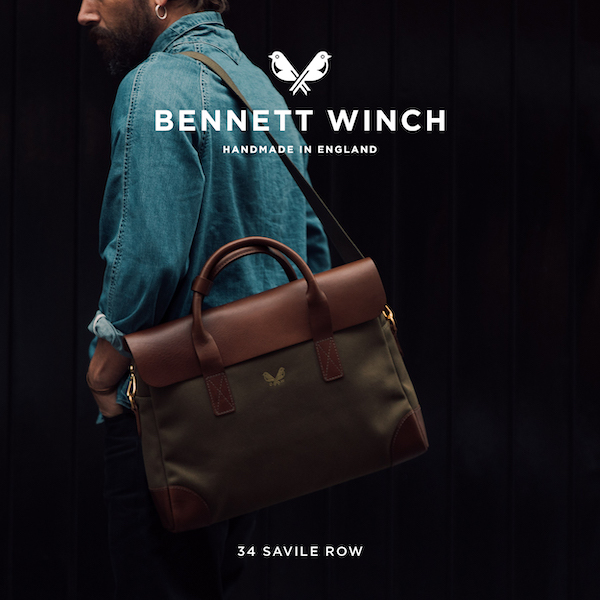




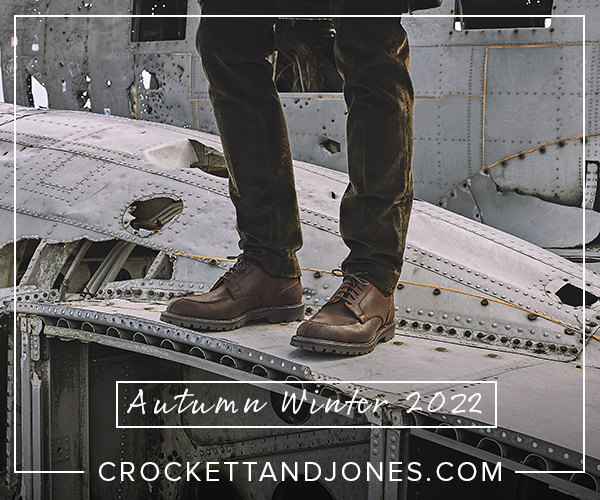


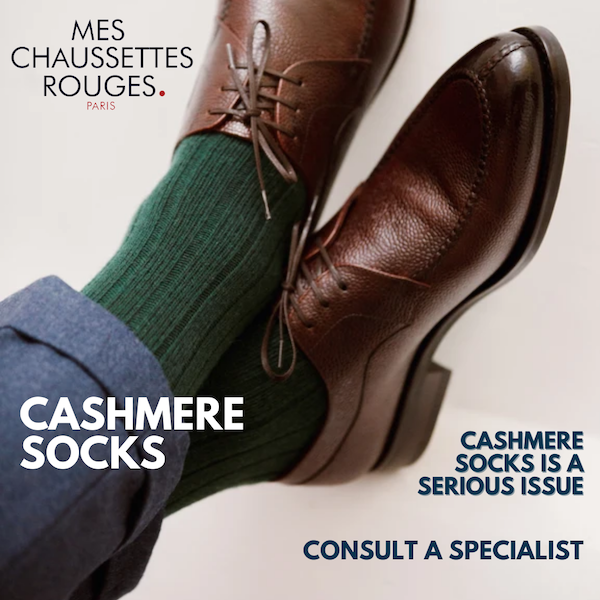








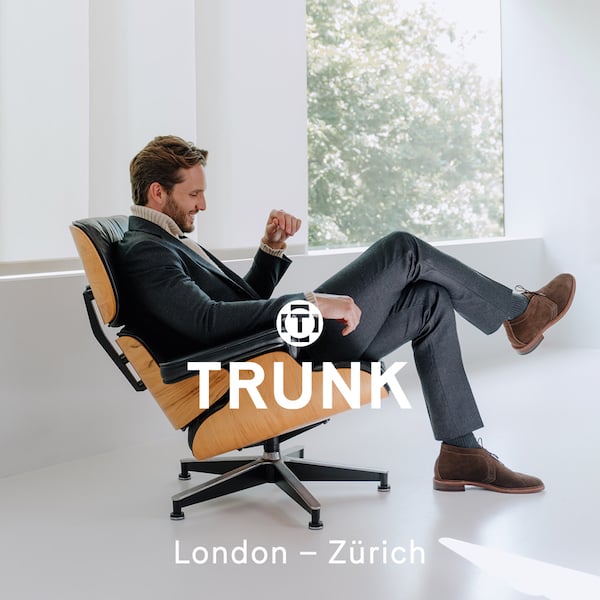

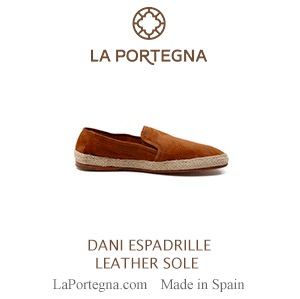
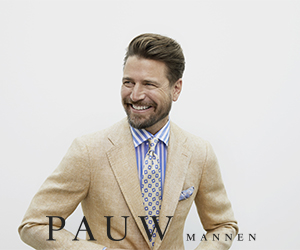

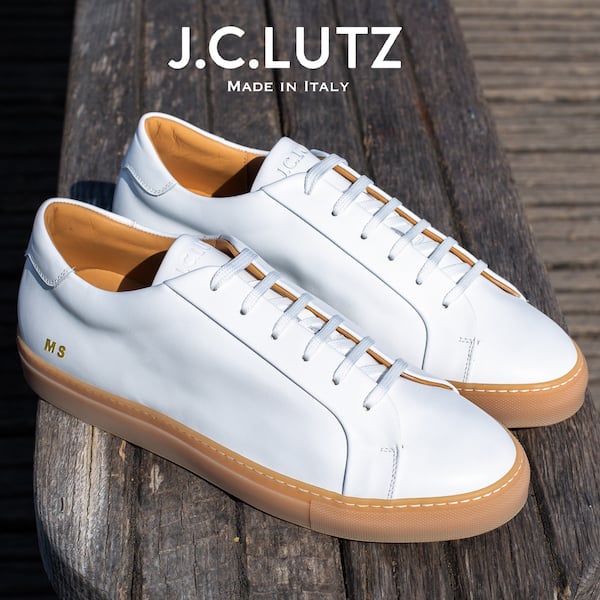

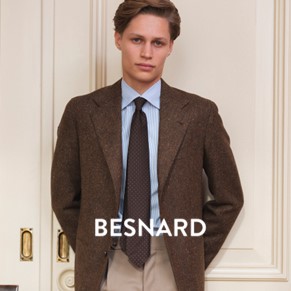
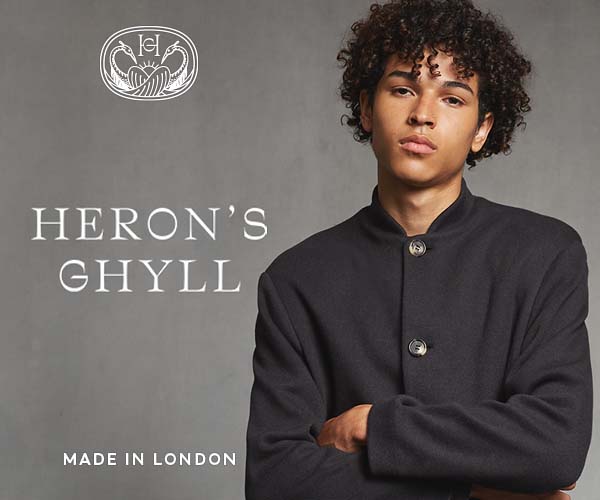

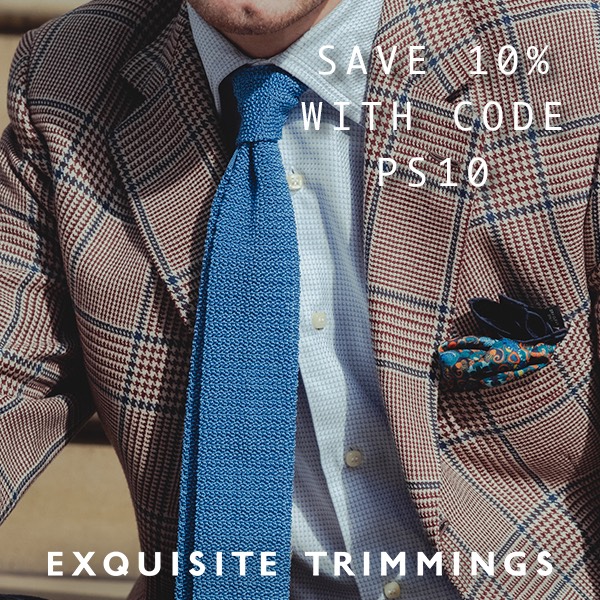
Brilliant post and excellent points. These points ought to be kept on a Post-It note by every man to remind himself that there is more to trousers than jeans and the annual suit.
The point about getting trousers to fit throughout the seat, drop and thighs rather than soley the waist is spot on.
Great post – out of interest, what would say a reasonable price would be for a made to measure trouser?
where would you recommend getting grey flannels?
Rik
What are the main points on pleats? (Formal, casual, high waist, fat, tall, comfort,old fashioned)
Good question
– I would always have them on high-waisted trousers, as some room is usually needed to get out and over the hip bones
– I tend not to have them on low-waisted trousers, as I don’t like the extra material. But it will always mean that the fronts won’t be as clean or deal as well with heavy use of the pockets
– They will usually look a little bit old-fashioned, but only a little, and obviously depends on the environment (ie who’s looking!)
– I would usually have just one pleat rather than two, as more means more of that extra material
– I don’t have much of a preference between forward and backward facing
Hi Simon
Can you give any recommendations for grey flannel trousers? My budget is pretty flexible with a preference for Uniqlo +J all the way to considerably more expensive if they’re going to be an investment to last years. I prefer slim cut, low waist etc.
Fantastic blog btw. I’m a regular reader.
Many thanks – Pete
Great post! Trousers seem to get neglected over ever other article of men’s clothing. Thank you for the tips.
Simon– Would you consider setting out a few guidlines apropos proportions as applied to jeans, grey flannels, summer khakhi, winter tweeds, etc.
Silk and or linen trousers (To be cuffed or not to be.) Optimum range in sizes ; widths of pantleg at cuff or hem. Depth of rise, and how such variables as height and booty size factor into the equation. (Not to mention a range of interpretation within parameters of Permanent Style.Thanks. –JC
Would you recommend any shops with nationwide branches for flannel, moleskin, and corduroy trousers? I visit London very rarely, and having just moved to a new city I’ve yet to discover the local shops.
Very well said, as usual. The first paragraph especially, as many men think of jeans as their default, even though they are uncomfortably warm in summer heat.
I have just adopted chinos after years of resisting them. They are obviously lighter weight and cooler than jeans, but I enjoy them mostly because they are not jeans. Mine are in shades of grey, because I find the khaki colours a bit standard.
Thanks for the comments all. Flannels are best sourced from suiting shops – Aquascutum, Austin Reed etc, as the odd trousers from a flannel suit. Better suiting shops will also sell them on their own.
Simon
i love this post! Thanks a million!
I absolutely LOVE this post! Thanks for taking time to post this.
Hi Simon,
Reading the above advice got me thinking: I like the idea of wearing cream chinos or tan, but would this be appropriate for the evening? The evening usually favours darker trousers, do you agree? Does that leave much choice other than indigo jeans for evening wear?
Yes, the evening generally favours darker trousers, though I would say formality is the biggest part of that and if the choice is jeans or chinos, formality is pretty much out the window.
Also, there are plenty of other dark trousers – charcoal flannels, navy chinos…
Hi simon,
would linen trousers be a good choice? im planning on making a pair of linen trousers but have no idea what cut to make them in as they seem rather fragile? any ideas?
marcus
Linen is less versatile but I wouldn’t change the cut. Just make sure they’re not too narrow
That’s just what I’ve been looking for on this website – your criteria about casual trouser width! Here you say but not too narrow! If I buy RTW chinos from Cordings – doesn’t the judgment if their width is too wide partially depend on my own body? Cordings is too small to offer RTW trousers in three different cuts (is that the right term?) – normal, slim, extra slim, as Charles Tyrwhitt does.
Yes Peter, it does depend a little on your body shape. And on the size of your feet, given they are relative to the shoe. But only marginally.
In the end it’s a question of style and taste, however. Just be aware that a narrower trouser will often appear younger (at least at the moment). I usually wear around 16 inches.
I’m sure this should be obvious but when you say your trouser width is 16inches – to which part of the trousers are you referring?
The very bottom, the cuff
Simon – I must be misunderstanding what’s meant by “width” then as 16″ would be enormously wide and it certainly doesn’t look that way in any of your photos.
16 inch circumference, sorry
Ah, that makes much more sense. Is this how you would communicate your preferences to a tailor, ie that you prefer a 16″ width?
Different tailors use different measurements – width or circumference, inches or cm
Why are trousers with turnups or a wider leg so hard to find these days & why do the majority of menswear shops seem only to cater for the younger male.
It’s just fashion unfortunately. And for the lack of quality shops serving older guys with classic style, consider the number of guys dressing like that. It’s a little chicken and egg, but everyone’s chasing the money and it’s mostly in youth. The only hope is the internet, with it’s lower costs. And without that we wouldn’t even be having this conversation!
With a fuller figure should I wear flannels with pleats,if the answer is yes double or single pleats.Where should the trousers sit,too low & im constantly hitching them up,too high & I look like someone in a 1920s movie.
What shade of color will be the best/most versatile for my first pair of flannels?
Probably a mid-grey…
Simon,
I am a longstanding client of neapolitan tailors and Savile Row (live around the corner of Luca and Mariano’s shop), but sometimes I want something simple made – like the trousers you mention above- and don’t think it requires top drawer tailors. Can you recommend a decent but lower end tailor in London who can make simple things?
Thank you
Eric
Interesting question Eric. Graham Browne could certainly make them, but I don’t think they would be at the level you would expect. How about some of the off-Row tailors, like Steven Hitchcock or Kent Haste & Lachter? I can’t recommend anyone in between those two unfortunately
Simon
Do Flannel trousers go also with sweaters and cardigans?
Absolutely!
Simon,
What kind of sports coat do you recommend with moleskin trousers (say something pretty informal, like Cordings)? Would flannel work?
It could do, yes, but don’t worry too much about the material or pattern. Do make sure it’s got some decent weight to it though. Also, flannel can still look a bit like an orphaned suit jacket, so try to add some odd-jacket elements (contrast buttons, patch pockets etc)
One additional question regarding flannel as a sports coat. If we assume that the cloths are of a comparable weight and harmonious patterns/colors, would a flannel sports coat pair well with worsted odd pants?
Many thanks.
Both run a risk of looking like orphaned suit parts, so I’d be cautious. With the trousers, avoid navy and any form of pattern – aim for a basic twill or plain weave
I’m surprised that you caution against patterns. Aside from pinstripes, I rarely see men wearing patterned suits, so when I seem a man wearing trousers of a non-pinstriped pattern (e.g., a fine hounds tooth), I assume that they’re wearing odd pants. Maybe a fresco or a worsted wool with a sheen or texture might contrast nicely with a flannel coat?
Hi Simon
Just looking into some mid/light-grey flannels and plan to wear with brown shoes or tan brogues.
Question is, should I consider light weight, smarter oxford brogues, like a Barker Newcastle or can you carry off a heavy, country style Loake Chester?
I’d have thought the country brogue might jar a little with the smarter trousers? Or are there flannels that suit that kind of shoe? Maybe fuller cut, more relaxed rather than slim fitting ones? Grey flannels are a tricky thing to source it seems.
All the flannels should be fine, but if you want to make them more suitable, then any flannel with more texture or pattern would be better (eg a longer nap – fuzzier – or more colour variation in the marl – the mix of fibres)
simon, do you typically get your wool trousers lined? what are the advantages/disadvantages of doing so?
Half lined in the front, yes.
It means your skin isn’t always rubbing against the cloth, and means the cloth passes more easily up and down when you sit down and get up.
Simon,
Many thanks for another great article. I have purchased a couple of pairs of chinos (both straight-leg and slimmer-leg) for wear with loafers and other British summer appropriate shoes. My research has revealed considerable variation in length. What are your thoughts on chino length if to be worn without a turn-up? Many thanks in advance.
Generally, just long enough at the back to have no break, and and small break at the front
Hi Simon would a pair of odd trousers made in mohair be weird (like it was part of a suit)? Thanks
Yes, probably
Dear Simon,
may I ask whether all your suits, impressively listed in the „Tailors I have used“ -post include two trousers? –
I am asking, because my tailor is convincing me to have only one trousers (in oder to avoid differences in color as well meticulous switching) which should apparently last as long as the jacket is still „good“, on the other hand, my Jeans for example only last a year on average, even the Drakes cotton ones you recommended start to wear out between the legs after only 10 times of wearing. It surely is different with a high twisted suit fabric and the bespoke fit – I am however still thinking whether or not I should pursue the old rule (if it is one?) of always ordering two trousers with suit since a jacket will surely last longer – hence my question what did you do with your suit orders?
Many thanks!!
Hi,
I think it is a good rule of thumb to always have two pairs, but I rarely do these days, simply because I have so many that the chances of them wearing out are proportionately smaller. I also don’t find my trousers wear out anywhere near as quickly as what you are describing, so perhaps your shape means you have more of an issue here. So balance up that potential issue and the number of things you already have, or plan to have.
Simon
Simon
Would you be able to give your advice as to when trousers should and should not have cuffs? I’ve seen both kinds throughout your posts, and am very curious as to your philosophy on this subject. Many thanks.
S
Generally, cuffs are less formal. I would generally have them on less formal trousers and suits.
However, the balance of whether a particular trouser is formal enough or not changes over time. I have a lot more with cuffs now than I would have done in the past. But a smart suit would still be cuffless
For a first pair of flannel trousers, I have the option to have one bespoke pair made (shocking expense for something relatively easy to make) or I could put that money into 2-3 pairs of RTW ones (Incotex, Rota, Ring Jacket, Zegna, etc). This would be my first bespoke piece made, trying to weigh the cost/benefit vs quantity.
If it’s your first pair, get just one pair of rtw and see how you like the style and fit.
Simon, follow-up question: Incotex were kind enough to send me 6 pairs of flannels (different cuts and sizes) to try on. Being a largely denim and cotton chino wearer, the Slim fit appeals the most, on account of “familiarity” of the cut of the legs. That said, what am I looking for in the leg fit? An unbroken drop from the seat to the shoes? How close should the leg hug the thigh before it’s too close?
Being a first pair, I’m thinking the chosen cut can be a “transition pair,” as a way to get me used to wearing casual trousers up the scale of formality without sacrificing the simpatico comfort of the chino zone. What do you think?
Also, both the Slim and the Normal fits have 15″ leg openings. Is that too narrow for turn-ups?
I lied—that was several questions.
It’s hard to describe the fit in that much detail, and the drop from the seat is a slightly personal choice as to how you like the slimness there.
The transition approach sounds sensible, I’d be minded to go for a more classic cut, not slim. And no, it’s not too narrow to have a turn-up.
Hi Simon,
From your vast experience, can you advise re point 2?
Is it better to take in the waist or let out? Which one is the harder job? I read that letting out the waist sometimes can leave some white whites??
Thanks.
Taking out the waist can leave white marks, but usually only if the trousers were garment-dyed or washed. So think RTW chinos.
On tailored trousers, it’s generally better to take the waist in, but it depends on your body shape. Taking in generally is easier because you don’t have to rely on the amount of inlay, which can be very limited.
Hi Simon! I know you have written that it does not matter where the clothes are from, if they are high quality, but just get some recommendation, I have found a store, that has Incotex chinos, but some of them are made in Italy, others in Turkey, therefore I wanted to ask, if you have had any experience with the ones made in Turkey? Are they any different to the made in Italy ones?Thanks!
I haven’t I’m afraid, all mine are made in Italy.
Thank you very much for your input and terribly sorry for so many questions. Sadly, I do have another, which goes into the odd trouser direction. How would you evaluate trousers in Houndstooth pattern in terms of versatility (a bit darker than your Vergallo blazer)? Is there any color that might go well with it? thanks!
Houndstooth trousers are very hard to wear – you need dark, plain knitwewar or dark, plain jacket on top, and dark simple shoes. I’d generally avoid them.
I can imagine that! Although the trousers by themselves look good, I had the gut feeling, that nothing good will come out of this. I will look at this as a mistake made during the learning process.
Simon, how do you feel about pants like these? Do you think they look too much like they’re part of a suit?
http://www.jamesbondlifestyle.com/product/acne-wall-street-shark-grey-trousers
It’s hard to tell, but they could potentially be too shiny, yes. Easier with knitwear than with a jacket
Hi Simon,
If I would like to try linen trouser, which color will you recommend first?
It depends on what you would want it for. Cream is the traditional and great, but you might not find it that versatile. I also like dark green a lot
Thanks for reply. I just struggle with these two colors. I search your website and find you rarely wear linen trousers, except this article
‘ getting-dressed-tan-jacket-and-green-linen-trousers’ . Is linen difficult to wear as trousers,so you put this at last in your recommendations?
I remember you said cream is most versatile color for trousers, but why cream linen trousers is not?
Thanks for your patience to answer my questions.
Cream linen is versatile, as all other cream, in one way – in that it goes with lots of colours of jacket etc.
But it has the issue that it can look a little too showy or fancy, given its brightness.
Simon,
Is there a color/contrast rule-of-thumb for pairing tops and bottoms? I rarely see a trouser or chino darker than the jacket and wondering if there is a way to wear dark, odd trousers well?
There is, yes, but it’s harder. Generally charcoal is the safest colour there. Navy only in chinos
I have a recurring problem with my pants (MTM) in that they crease right below the buttocks, like this: https://www.styleforum.net/content/type/61/id/2224777/width/350/height/700
I have heard conflicting ideas as to what’s causing this (seat too tight, too loose etc.). I have muscular thighs (24in), and a relatively narrow waist (32in), and buying off the rack is a nightmare for that reason. As for bespoke it’s still out of my reach…
Simon, have you had this problem before? And if so, how did your tailor fix it?
It’s very hard to tell from an image exactly what the problem is, hence the conflicting ideas about solutions probably.
To me it looks like the upper thigh and lower seat being too tight, and you could try to get a tailor to let it out there. The problem will be that there is unlikely to be much inlay (excess material) there.
You may be best looking at made to measure. Or, try sizing up in trousers so they fit in the seat and thigh, and then have the waist taken in.
Thanks! So there seems to be no obvious fix for this. I think I’ll go bespoke on my next pair and see if I can finally get pants that fit.
hey Simon I’m just looking into buying my first pair of flannels would you say that a pale grey is much better than a darker shade
many thanks
A mid-grey is probably going to be the most versatile. Go for light grey as a second pair
Good evening Simon
I’m looking to have a pair of grey flannel trousers made by my tailor and I have two doubts:
– Slant hip pockets or besom pockets? http://henrydavidsen.com/wp-content/uploads/2013/03/IMG_3294.jpg I really hate when the pockets flare, so I’m interested in the besom pockets, I also like the look. I realize that if pockets flare that means there’s a fit problem, but still.
– I would like to try a waistband with daks adjusters. How do you feel about them? I’ve only tried the side metal adjusters so I don’t have any experience with the daks adjusters. Pros and cons?They would be too formal for a pair of flannel trousers?
Hi Federico,
Personally I prefer slant pockets. I don’t find besom flare much less and I prefer slant pocket style – besom pockets look like they’re floating.
Daks adjustors can be nice, if you’re fine with the slight feeling of elastic. I don’t mind them at all, and no they’d be fine with flannels.
the thing with daks adjustors is that I heard the elastic might lose its elasticity after a while, is that true?
I’ve never found it to be so. But it wouldn’t be the hardest thing in the world to repair if it ever did happen. And of course, if they’re fitted well already, you’re not going to be super-stretching them anyway
Simon,
I too am a fan of DAKS style side adjusters. I personally think they look better. With my recent suit I got an extra pair of pants, so I had one made with the slide buckle variety, and the other with DAKS. I like the DAKS better, although it has been a short period of time and my waist hasn’t changed much so I may change my mind down the road. It is hard to find well constructed DAKs side adjusters in ready to wear clothing, even some made-to-measure people don’t make them. Do you have any suggestions for ready-to-wear brands that make good trousers with DAKS side adjusters, price up to $500. Any more than that and I could just get my tailor to make me a pair.
I’m afraid I don’t, no, sorry
Since I’ve taken to wearing my trousers at the navel, I’ve noticed a persistent horizontal crease has formed in my trousers about an inch below the belt (maybe because I spend a lot of time sitting). Is that common and should I take it as an indication that something is wrong with the way my trousers fit? Thanks
It can happen and doesn’t necessarily.mean there is something wrong – it all depends on your physique and the style you want, whether the tailor can do anything to prevent it
I’m lean and like a slightly higher waist, as I find it makes me look taller. But I’ve never seen or heard anything about that. I guess all I can do is press that crease out every now and then? Have you had that problem yourself? Thank you
Yes actually, even though I wear mine on the hips
I love flannel trousers but today, as I was getting into my car, I cracked my favorite pair… I had gotten it only last winter. My question is, does this happen to you too and how to avoid it?
Do you really mean ‘cracked’?
Well, it is pretty cold today
As in the seat tore along the thigh, yes. Does it have a different meaning you were thinking of?
Oh, I see. I just wasn’t clear.
It’s happened to me only once, when the trousers were wet. That’s the big issue – wool loses most of its integrity when it gets wet
It’s happened to me at least twice. I do have rather muscular thighs so that might have to do with it, but the last pair was made to measure so there shouldn’t have been any particular tension. Would you suggest particularly heavy weights in flannel so as to avoid this?
And still curious what you understood by “cracked”…
I really had no idea!
Yes heavier weights will help, but flannel is also never that strong
Oh also, what would you do with torn trousers? Throw them away?
Sometimes they can be patched inside if the rip is small and it’s a relatively hidden area
In the last 6 months I’ve ripped one pair of linen and and one of flannel trousers. I am going to have to stop deadlifting and squatting so much, but until then, do you have any recommendation on stronger fabrics (or fabrics that handle torsional forces better)?
I am hesitant to spend too much on trousers until I figure out something more robust.
Well certainly not linen and flannel… Try cavalry twill or covert cloths.
Are brown moleskins still part of your recommended beginner’s wardrobe? I don’t think I’ve actually seen you wear them – and I’m sceptical as to how they’d go with more casual shoes (mine being mostly tan to mid-brown).
Hi.
No, I’d probably recommend tan or khaki above them actually.
I still like brown, but flannels might be easier – and they can work with brown shoes if there’s enough contrast. See example here.
Hi Simon
How would you style brown moleskin trousers – would pleats and cuffs be acceptable despite the fact that moleskin is typically a more casual fabric and made of cotton? What shade of brown would go for? closer to tan or closer to black?
I’d go for darker, probably, and keep cuffs but probably not pleats – most moleskin would be too thick and spongey for moleskin
I’m not an expert, but I’ve always thought moleskin was the perfect thickness for moleskin haha!
Oops! I meant pleats, of course…
Simon – I understand this may be venturing somewhat into the realm of personal preference but could you breakdown the dimensions & proportions you look for in a pair of trousers, i.e. how much of a taper to the leg, how high a turn-up, if a break, how much etc etc.
Sure, perhaps in a separate post?
That would be appreciated. General guidelines such as these would be very helpful for those of us just beginning our journey.
Of course. No problem
Hi Simon,
In the coming months, I’m looking to have some custom trousers made. I find off the rack/peg trousers rarely have a rise high enough for me (more a comfort issue, than a look issue) and the angle of the seat to my legs is never right and there’s always a crease there on the back.
Aside, from fit and aesthetics, what are the critical elements to ensure are present in a bespoke pair of trousers? I’m thinking analogous to your advice on jackets (ensuring hand padding of the chest) and shirts (collars sewn on the round). Is there anything critical in construction for trousers? Or are bespoke trousers exclusively about fit and aesthetics, similar to shoes?
Hi,
There isn’t much to the make of trousers from a quality point of view, no. I wouldn’t worry about that. Mostly the work will be about aesthetics – more expensive, often Italian bespoke trousers will have more tack stitches, pick-stitched seams and so on.
(Shoes, by the way, do have more quality points that are about make – probably more than shirts)
Hope that’s helpful
Thanks Simon, very helpful indeed!
And on second thought, you’re of course right about there being more key construction elements to shoes than shirts. I wasn’t being very precise there.
Much appreciate your seemingly endless commitment to answer all our questions!
8 years later would you personally hold #4 true for your core wardrobe? Having trousers made-to-measure as opposed to bespoke.
What defines a good trouser fit? Should one be able to sit criss crossed comfortably? I have MTM trousers that look good, but I can’t exactly kneel well or be super flexible with them.
Yes, in general I would stand by point 4 for most people.
I still have a lot of trousers made bespoke, but they are a far lower priority than jackets.
Good trouser fit is a large part personal preference as well as technical correctness. So for example, they should not slip down and hold you in the waist, technically, but most of the fit through the leg is largely personal and a question of style. Having said that, it sounds like yours are too tight to really be functional.
In this case, what should I correct? The leg/knee area? Or thigh? Doing lunges in my case is quite impossible, but I don’t know if my pant should even accommodate that. Reaching for something that’s dropped also pulls the pant.
For your jeans you had one made that goes from high rise (in the back) to mid-rise in the front. Would you recommend do that with MTM or bespoke pants?
It’s impossible to tell without seeing them, I’m afraid, but from the sounds of it they sound too tight almost everywhere.
Yes, that rise combination works nicely – though if having them made, do ask the tailor would they suggest in terms of what best suits your body
Simon what do you think of the ghurka waist currently in vogue for trousers?
I appreciate the look, especially with shorts, but can’t help but think they look a bit stylized on trousers; especially with dress shirts tucked in, they’re almost a bit distracting (especially with pleats)? It’s almost too many details on one pant.
I agree. It’s nice if subtle and slightly hidden, so you only see it by degrees. But with pleats it’s a bit much for me. Also better in more conservative colours, patterns etc as a result
Simon why do you recommend people start slowly when first building their wardrobes, even if they know a fair amount about menswear?
Well, it depends how much they know of course, but I find that when people are starting with bespoke, they take a while to find exactly what style, rise etc they like. So it’s good to start slowly
Hi,
You mentioned the first pairs of trousers a man should own. Does the colors matter with the skin and complexion of someone? Or they are good for everyone? I have a salt and pepper hair but my eyebrows are still darker than the hair… thanks!
With trousers, no it doesn’t matter much. More relevant for things like shirts – closer to the face
Does the colors matter only for the shirts,polo shirts,sweaters or also for the jacket as well? Thanks!
Also for the jackets
If I may…
I am a very keen owner of flannel trousers and suits and have excessive numbers of both.
Overall, I do agree with your recommendation for grey flannel trousers. It cannot be faulted. However, for a person who is generally younger or hipper or less formal, a good alternative can be a high twist cloth or even a hopsack. I would then avoid a shade of grey that seems more like a suit ( ie go lighter or darker, don’t go bland ) ; I would make sure it has some texture ( again to avoid it looking too much like suiting ) ; and I would make it heavier ( atleast 12 ounces, maybe 14/15 ) because it drapes and wears better.
Just a thought.
Nice point – flannel can look a little old-fashioned.
I would have said high-twist or hopsack would be more formal than flannel though? Sharper and cleaner
Hence my comment on being selective about it being more on the textured / rougher end of the scale so it does not look too formal. These cloths are also much lower maintenance than flannel which, much though I am in love with it ( and I am ), is a pain in the proverbial to keep looking sharp, especially if one is generally a hard wearer, or if it gets wet, which it can often do in northern European or east coast USA climate.
Very true. High twists and twills like coverts or cav twills are much harder wearing.
Personally, I’d still say a more textured high twist would be more formal than flannels, but they’re a lot closer then.
Hi Simon
I have noticed there are chinos with a crease in front and the back all way down the leg.
Can these type be used in casual settings? Without a sport coat just a casual Jacket.
And if i want to put some turn ups on some pants, corduroy,moleskin ,flannel for eg. It’s necessary to have that crease in them? I want to wear them as casual as possible,with knitwear ,a casual jacket,but still some leather shoes. Thanks!
Chinos have creases put in them when they iron them really – it’s up to you whether you want them there or not.
They can be worn more casually, yes. See my Stoffa trousers here for instance. A crease will usually look smarter, but the smartness is much more dependent on the material – eg coarser fabrics in chinos will be more casual.
And no, a crease isn’t necessarily required for trousers with turn-ups, though they may suit it better. More casual trousers tend to just be turned up, rather than ironed or sewn in place (eg jeans, but chinos too)
Hi Simon,
You said that the crease in the chinos it’s made by ironing however i saw on Ralph Lauren suit chino trousers with no belt loops and with a crease in them… I thought chino is a casual type of pants and trousers are for suits. Isn’t suit chino trousers a paradox? Can those suit chino trousers be worn in a casual settings without a blazer or jacket? Maybe Harrington , quilted ,peacoat?
Thank you!
Not necessarily, chinos can be fairly smart if in a finer cloth. It has become a fairly generic term these days.
And yes they can, they’re nice worn that way.
I have checked,the suit chino trousers are 100% cotton so it’s not a fine cloth i suppose? Also what brands do you recommend for chinos and flannels? I am strugling with finding some flannels and the incotex chinos are in a slim fit. Also could a pair of indigo denim ,like those from Albam could work with a calfskin tan loafer? Thank you very much for taking the time to reply!
It depends on the cotton I’m afraid…
Try Anglo-Italian or Drakes
I contacted Ralph Lauren and they said the crease it’s permanent and for the fabric it says only cotton. It’s that good or bad dor casual settings I don’t know.
Also for the 4 first pair of trousers to have you mentioned cream but you said that it’s for summer so for fall i have the other 3 options , moleskin flannel indigo jeans.
And regarding the last question can a tan penny loafer work with indigo jeans? Thank you and sorry for all the nagging questions!
Hi Simon,
What brand for chinos do you recommend to wear them with a calfskin wingtip or a suede chukka even with a common project sneakers in a casual setting along with a bomber jacket ,maybe a safari jacket in Spring? Maybe sometimes I will wear only a t shirt not a shirt.
Trunk has a model and I found that Anglo Italian has some nice pairs.
https://www.trunkclothiers.com/products/trunk-welbeck-regular-fit-cotton-trousers-beige?variant=15419496202275
https://angloitalian.com/products/garment-washed-cotton-trouser-stone
Hi Simon, as a general rule for trousers alteration, when the tailor has to increase or reduce the width at cuff (from 14.5 to 15.5 inches), or make a slimmer/wider leg fit, is he/she supposed to always unstitch both the inner and outer seams of the legs? And, is he/she allowed to iron a new central crease, or is it a sacrilegious practice? Thank you, GB
They can do it from either, and yes they will probably iron a new crease, if it’s position has changed at all.
Thank you Simon, now I know I should keep my tailor but change my laundry 🙂
Let me bother you with another super basic question: I’ve noticed that in some of my trousers (altered by various tailors) the legs’ inner seams are not aligned with the cuffs’ inner seams (the short part that goes inside the leg and then is covered by the heel guard). On the outside, at least, there is no misalignment.
So, is this a mistake due to poor precison and care, or is something done to avoid having 3 (well, 4) layers of stitched fabric overlapping one another? These trousers are made of wool and cotton, not of heavy corduroy or moleskin…
Thank you,
GB
I don’t know to be honest, but I would say don’t worry about it if, as you say, the effect on the outside is fine
Hi Simon,
I have some olive green cotton trousers part of a “weekend wardrobe”. However most of my casual jackets are in navy ,just a light grey shacket which I think works good with olive trousers. But when I wear this trousers with a navy jacket it seems that even though the trousers and the jacket, a Harrington by the way, are not formal the whole outfit seems formal ,maybe because of the colours all together? How can I decrease this formality from the two colours?
Thanks!
I guess navy is fairly smart, and the trousers might be in a smart cotton, I don’t know.
As the Harrington gets more worn, that will certainly help. Otherwise, something like a denim jacket or even just T-shirt underneath?
Thanks Simon,
Could a dark brown casual jacket decrease the formality? The trousers are in plain lightweight cotton with belt loops and no pleats,they are not that smart.
Thank you!
Yes, dark brown might help
Simon,
I read that even though navy it’s smart as a colour the formality decreases with cloth and design so I guess that a navy Harrington it’s not that smart? Also the olive green trousers,since they have belt loops ,no pleats and being a lightweight cotton that makes them less formal so the overall outfit it’s no smart? Or it doesn’t matter those aspects?
Thank you!
Yes, you’re right, a Harrington is not that smart so even in navy, it remains not that smart. But still smarter than a Harrington in another colour.
With the trousers, yes all those things are correct. But they could still be a little smarter than some chinos because the cotton is smoother/finer, and a fairly dark colour.
Hi Simon, do you have any recommendation for tailors in London that can make a pair of pattern-cut trousers for under GBP 500? I would be happy to try out young freelance tailors. I’ve had suits and coats made on the Row, but would like to be a little more economical on my odd trousers. Thanks.
Including cloth? I’m not sure I do in that case I’m afraid
Hi Simon, yes, including cloth. If GBP 500 is not feasible, can I ask what a more realistic amount is, and which tailors in London would be able to operate at that level?
It probably isn’t, given the cloth could cost half of that, once you take off the VAT.
I’d suggest the offshore programme at Whitcomb & Shaftesbury. Have a look at my articles on them
Hi Simon, I have RTW single pleated pair of trousers in mind, but unfortunately, my size isn’t available, which leaves me with three choices.
1) If I size down, the waist fits perfectly, but the seats, thighs, and calves must be let out slightly (1-2cm).
2) If I size up since the waist, seats, and thighs are too roomy, they must be let in.
3) Forget them.
What would you suggest in this case?
Many thanks,
Jack
I think if you have to alter the thighs and seat in either case, I’d forget them.
If it was just a question of changing the waist or changing the legs, as I find it more often is, then I would change the waist and leave the lergs
Thanks, Simon. I thought you would say that. When you say ‘legs’, does it include bottom width as well?
Yes
Hi Simon, after receiving my first bespoke trousers, I noticed my main issue with RTW trousers was the length of the back rise. When I measured and compared them, everything else was almost the same, but the difference in the back rise was significant (around 6cm longer for all RTW trousers).
Do you think these trousers’ back rise could be altered?
Many thanks,
Jack
No, you can’t alter a back rise Jack
Do you think I need to go for bespoke or at least MTM to get a good fit for the trousers, then? I guess my forward-tilted hip and locked knees make all my RTW trousers have some bagginess around the back-rise area.
Not just for the rise, no. If you hunt around you will be able to find trousers with a higher back rise, or higher rise generally
Generally, does the rise have to be higher to resolve my issue? I thought I needed a mid-front rise (just below the hip bone) and a shorter back rise to cover this.
Sorry Jack, I thought you were saying in your previous comment that a higher back rise was better for you. You’re saying it was better when the back rise was lower, because you think of the angle of your hips?
Yes, Simon. My bespoke trousers don’t have that bagginess issue around the hip, and only the back rise measurement of the trousers was significantly shorter than that of my RTW trousers. This is why I thought the back rise would be the only issue in this case.
OK understood Jack. Shortening the back rise is possible, but not by very much before the pockets start to get too close to the waistband and look a little odd. Not a small job either
if he has a forward tilted hips, the fix for this is altering back rise.. at the most basic, it’s undo the waistband on the back, shorten the rise and sew the waistband back on. it’s the most simplified way to explain… I’m sure it’s not 6cm, and it’s expensive, but it’s doable…. one of my trousers had a problem when experimented with longer back rise. and that was the solution…
https://putthison.com/a-bespoke-tailor-explains-how-trousers-should-fit/
I see. Thanks, Martin. How was the outcome? Did it turn out well without looking awkward?
my issue was, I was playing with measurements and going with higher back rise. well, this one turned out about an inch too high, so rise was bunching. took me a year to send them back to yeossal, as a “hey lets try it and see what happens and if I’m not happy I promise not to blame you” . and it’s really summery trousers so I wore them just once. but it’s much better than it was before.
I dont think I’d try to do it on a slim trousers, and I wouldn’t go to cheap cornershop, also if trousers were cheap, I don’t think I’d bother, I never could accept paying more for alterations than for a piece itself, unless it’s really special piece…